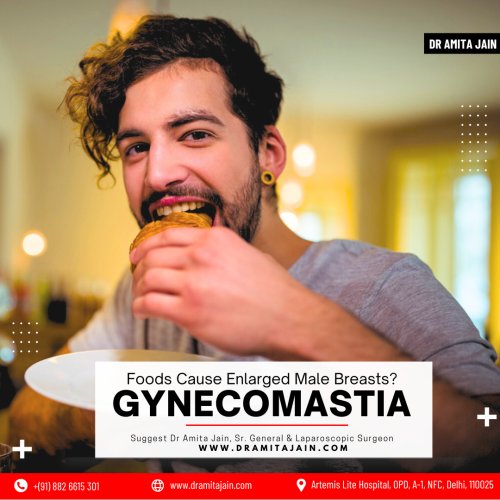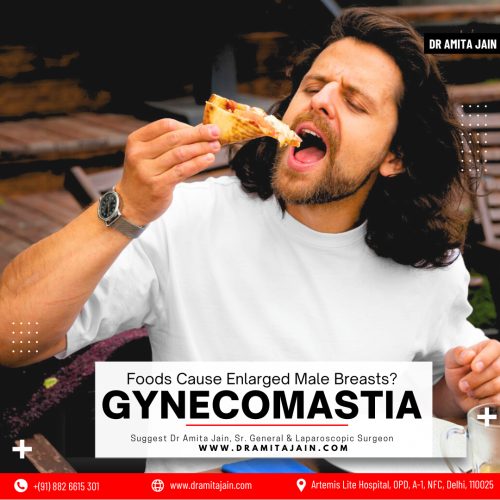Enlarged male breasts, a condition medically known as gynecomastia, can be a source of embarrassment and low self-esteem for many men. While the condition is often associated with hormonal imbalances or certain medications, dietary habits can also play a significant role.
Certain foods are known to affect hormone levels in the body, particularly estrogen and testosterone, which may contribute to the development of male breast tissue. In this article, we’ll explore what causes gynecomastia and how specific foods may be contributing to it, as shared by India’s top general and laparoscopic surgeon, Dr Amita Jain, who is also a top surgeon for gynecomastia.
What Causes Enlarged Male Breasts?
Gynecomastia occurs when there is an imbalance between estrogen and testosterone. While testosterone is the primary male hormone responsible for muscle mass and male traits, estrogen, though present in small amounts in men, is the hormone responsible for female traits, including breast development. Several factors can disrupt this hormonal balance:
- Hormonal Imbalances: Due to aging, puberty, or certain medical conditions
- Medications: Such as antidepressants, steroids, and heart medications
- Obesity: Increases fat, which converts testosterone into estrogen
However, certain foods are also suspected to mimic estrogen or reduce testosterone levels, potentially leading to breast enlargement in men.
Foods That May Contribute to Male Breast Enlargement
Soy Products
Soy contains phytoestrogens, which are plant-based compounds that mimic estrogen in the body. While moderate soy consumption is not usually harmful, excessive intake of soy milk, tofu, soy protein, or edamame may potentially influence hormone levels, especially in individuals already at risk.
Hard Drinks
Hard drinks like beer are rich in phytoestrogens, particularly due to the hops used in brewing. Combined with other hard drinks’ role in impairing liver function (which processes estrogen), frequent beer consumption may raise estrogen levels and promote gynecomastia.
Processed Foods and Refined Carbs
Foods high in sugar and refined carbohydrates can lead to weight gain and insulin resistance, which in turn can cause hormonal imbalances. Excess fat also increases aromatase activity—the enzyme that converts testosterone into estrogen.
Dairy Products with Hormones
Some dairy products may contain added growth hormones or antibiotics, especially if sourced from animals treated with synthetic hormones. These can disrupt the endocrine system and lead to elevated estrogen levels.
Fast Food and Junk Food
Heavily processed fast food often contains trans fats and additives that can disrupt hormones and promote weight gain, both of which can contribute to gynecomastia.
Licorice Root
Licorice contains a compound called glycyrrhizin, which can lower testosterone levels when consumed in large quantities. Over time, this can contribute to a hormonal imbalance.
While diet alone may not be the sole cause of enlarged male breasts, consuming certain estrogenic or hormone-disrupting foods in excess may increase the risk, especially when combined with other contributing factors like obesity or medication. Maintaining a balanced diet, managing weight, and moderating intake of processed or hormone-rich foods can help prevent or reduce gynecomastia. If you notice persistent breast enlargement, it’s best to consult a healthcare provider to rule out underlying medical conditions and receive proper treatment.

Dr Amita Jain, one of the most experienced General and Laparoscopic Surgeons in Delhi, is widely recognised for her expertise in hernia, piles, gallbladder, fissure, and fistula surgeries. With an outstanding career spanning over 29 years, Dr Amita Jain has earned her place among the top General and Laparoscopic surgeons in Delhi and India, known for her precision, compassion, and consistent surgical excellence. She was the Professor of Surgery at the Army College of Medical Sciences and Base Hospital, Delhi Cantt. In 1994, she was commissioned as a surgeon under the United Nations Mission in Congo.
Dr Amita Jain currently serves as the Head of Department and Senior Consultant for General, Laparoscopic and Trauma Surgery at Artemis Lite Hospital (Delhi), Rosewalk – Luxury Maternity Hospital in Delhi and Rainbow Children Hospitals (at Malviya Nagar and Panchsheel Park, New Delhi)
Dr Amita Jain has successfully performed a wide range of complex general surgeries, including both open and minimally invasive procedures, with a strong focus on trauma care, onco-surgical techniques, and reconstructive surgeries. Her medical specialisation includes – Gallbladder surgeries, appendix removal surgeries, hernia repair surgeries, Pilonidal Sinus treatments, varicose vein and piles surgeries, fistula surgeries and fissure surgeries.
Dr Amita Jain has also authored some of the key medical journals and publications, like ResearchGate, IJSR
Note: the articles are written with Dr Amita Jain’s professional insights and referring to her medical publications.

